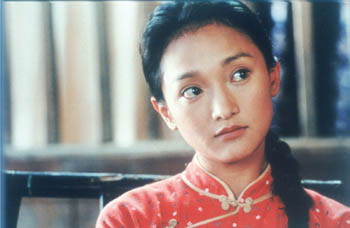![[Metroactive Movies]](/movies/gifs/movies468.gif)
[ Movies Index | Show Times | Silicon Valley | Metroactive Home | Archives ]
Bad Re-Education
Balzac, Flaubert and Communism collide in 'Little Chinese Seamstress'
By Gretchen Giles
THE SOFTLY LIT scarlet-colored slippers that grace the cover of Balzac and the Little Chinese Seamstress are almost more familiar than the title. Dai Sijie's first novel, translated from the French into more than 30 languages, was a runaway bestseller in 2003. As versatile as his characters, Dai has since adapted Balzac for the big screen, not only writing the screenplay but directing the feature.
Based on his own experiences, Balzac and the Little Chinese Seamstress takes place in the Dark Ages of Mao's Cultural Revolution. Two students, Ma (Ye Liu) and Luo (Kun Chen), are removed from their bourgeois homes and put in a re-education camp high in the poetically named Phoenix Mountains. Both men possess talents beyond those of the villagers in the remote crest where they toil. One can play the violin, bowing Mozart's Requiem into the more accepted title, Mozart Is Always Thinking of Chairman Mao, for the entranced peasants. Both can read, but nothing other than the edification of Mao's little red book is allowed.
Forced to literally carry buckets of shit as they work to fertilize the fields, the two friends worry that their entire lives will be spent in the lonely harsh beauty of the Phoenix range. And then two good things happen: one involves art and the other, of course, a girl.
Bent and brittle, the tailor makes his annual pilgrimage to the village, an assistant carrying a table and sewing machine up the ridge, the tailor's daughter following behind. The Little Seamstress (Xun Zhou), as she is called, is a self-assured young woman with a saucy set to her mouth and no education. Stealing a box of illegal literature from a student just ending his re-education, the boys set out to introduce their new friend to the glories of Balzac, Flaubert and other French writers. The Little Seamstress becomes entranced, falls in love and moves beyond, the boys just as shocked as she at her eventual—and sophisticated—transformation.
Just like human history, Balzac is all about storytelling. Dai himself was held in a re-education camp during the Cultural Revolution. Like Ma and Luo, he and a friend stole forbidden books and read them to an uneducated girl from their new village. Like Luo, his friend fell in love with the girl. And like everyone, Dai conceived a story that he yearned to tell. The transformative art of literature is not a new story, but its repetition endlessly fascinates our animal. Ma and Luo are commanded to tell stories constantly, sent by village elders to a nearby town, where educational films are shown. Once learned, the films are retold by the boys to the rapt attention of the villagers, who rework the Communist drivel to better match the great work of Balzac.
Balzac is a slight film about the power of plot and the abject nakedness of human life without art. The end piece, set some 25 years after the main plot, is jarring and betrays Dai's lack of experience as a filmmaker, but the journey to that precipice is gentle, joyful and makes one itch for the long-term relationship that results from reading a really good novel.
[ Silicon Valley | Metroactive Home | Archives ]
![]()

Stitch in Time: Xun Zhou plays the little Chinese Seamstress in Dai Sijie's film adaptation of his novel.
Balzac and the Little Chinese Seamstress (Unrated; 110 min.), directed by Dai Sijie, written by Dai Sijie and Nadine Perront, photographed by Jean-Marie Dreujou and starring Kun Chen, Ye Liu and Xun Zhou, opens Friday at selected theaters.
Send a letter to the editor about this story to letters@metronews.com.
From the August 31-September 6, 2005 issue of Metro, Silicon Valley's Weekly Newspaper.